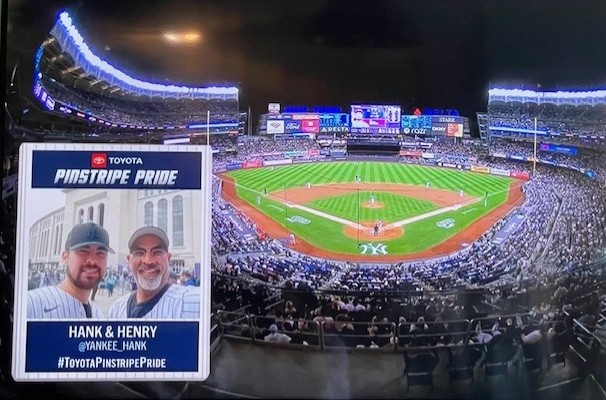
Pitchers and catchers report in mid February, the rest of the players follow a week later, and it begins. The first games are in early March, and we begin to see evidence of baseball in highlights shot from odd angles and showing the previous year’s heroes hitting home runs against pitchers we’ll never hear from again. April blooms soon enough, bringing with it a bouquet of baseball. The grass is green, the rookies are raw, and hope is everywhere. A team that had lost a hundred games the year before could make the playoffs; another that lost a hundred games three seasons in a row only a few years earlier could make the World Series. A young rookie might defy the experts and hit fifty home runs; a pitcher unlikely to make the rotation could end up in the Cy Young conversation. A team the experts pick to finish at the bottom of the division could surprise everyone and make a run deep into October.
More than any other sport, baseball is about hope. On Saturday night, hope ran out for the New York Yankees.
They entered the night the same as they had the night before, needing just one win to advance to the World Series and a matchup with the franchise’s most common autumn dance partner, the Los Angeles Dodgers. They exited the way all but one team will, short of the ultimate goal.
There were signs as early as the first inning that this would be a challenging night. Charlie Morton was on the mound for the Astros, and he was ready from the first pitch of the game. He struck out Brett Gardner and Didi Gregorius on three pitches each and had little trouble dispatching Aaron Judge in between, spending just ten pitches in the frame. The Yankee dynasty of the late 90s pioneered the idea of working pitch counts to drive starting pitchers from the game, but these Yankees were much more aggressive, especially during this series. Six Yankee at bats on Saturday night lasted only one pitch.
Opposing Morton was none other than the Yankee Savior. CC Sabathia had compiled a 10-0 mark in 2017 with an ERA under two in starts following Yankee losses, so it appeared that the right man was on the hill for New York. He started the game even more efficiently than Morton, yielding a leadoff single to George Springer, but needing just three pitches to retire the next three hitters on three ground balls.
But Sabathia’s control wasn’t as sharp as necessary, and after that first easy inning, the rest of his night would be incredibly stressful. He put up zeros in the second and third innings, but those frames weren’t easy. He threw twenty pitches (ten balls and ten strikes) while allowing a hit and a walk in the second (and he was saved when Judge made a brilliant play to steal a home run from Yuli Gurriel), and then eighteen more pitches with another hit and a walk in the third. Each inning’s last out came with a clear sense that CC and the Yankees had dodged a bullet.
The team once called the Colt .45s took dead aim in the fourth, and this time Sabathia wasn’t able to escape. Designated hitter Evan Gattis started out the inning by battling through six pitches, fouling off the last three shots at his weakness, fastballs at the top of the zone. He laid off a slider down low, but then CC allowed a 2-2 slider to float up into the zone a bit, and Gattis crushed it over the high wall in left center for the first run of the game.
Even at the time, that home run felt huge. Morton was busy doing his best Justin Verlander impression, mowing down Yankee hitters as if they were dandelions in his front lawn, while Sabathia had been spinning plates on poles all night. The first dish had fallen, and it seemed like only a matter of time until the rest came crashing down around him.
It wouldn’t take long. He walked Brian McCann, and two batters later he gave up a loud single to Marwin González to put runners on first and third with one out, and that would be it. In any other game, probably even in any other playoff game, Sabathia would never have been lifted after giving up a single run in three and third innings, but not even CC was surprised when Joe Girardi hopped out of the dugout to get him.
When Sabathia handed the ball to Girardi, it was one of the most pivotal moments of the game, but there was something more. Sabathia had arrived in New York the year after Girardi had taken the helm, and during that time Girardi sent him to the mound 255 times in the regular season and 17 more in the playoffs, far more than any other pitcher. With both men unsigned beyond this year, this could’ve been their final meeting on the mound.
But the game and season was in the balance, so Girardi had no choice but to go to the bullpen. The formula I had had in my head prior to the game had been four innings from Sabathia followed by five from Tommy Kahnle, David Robertson, and Aroldis Chapman, so perhaps, I told myself, CC’s early exit wasn’t as worrisome as it seemed. Kahnle entered the game, only two outs ahead of my schedule, and used just one pitch to get those two outs on a ground ball double play from George Springer.
The game almost changed in the top of the fifth. Morton had been cruising, needing just 36 pitches to cover the first four innings, but Greg Bird greeted him by rocking the first pitch of the inning to right for a leadoff double. Morton rebounded by striking out Starlin Castro, but then Aaron Hicks walked on four pitches, the fourth ball being a wild pitch that allowed Bird to move to third, and the Yankees were putting together their first rally of the night.
With runners on first and third and a chance to at least tie the game, Todd Frazier dribbled a soft ground ball towards third. Bird and third baseman Alex Bregman were both in motion immediately, Bird breaking for home and Bregman charging hard for the ball. Knowing he had no chance to turn the double play, Bregman instead scooped the ball up and fired home, hoping to cut down the run.
No one can be faulted here. Down by a run in the seventh game of the series and facing a dominant pitcher, the Yankees had to put on the contact play, even with the slowest runner in the lineup on third. Even as Bird was lumbering down the line, it was clear that Bregman would have to field the ball flawlessly and make a perfect throw to get the out. He did both. His throw hit McCann’s glove two inches above the ground and two inches in front of the plate, arriving a breath before Bird’s outstretched leg. If everything hadn’t worked perfectly for the Astros, the game would’ve been tied and the Yankees would’ve had two runners on with only one out. Instead it was two outs, and when Chase Headley followed with a ground ball to second, the Yankees’ best chance was wasted.
But it was still only a one-run game, and New York pressed forward, leaning on a bullpen that had been the strength of its team. Kahnle, in particular, had been a revelation. He hadn’t been the “player to be named later” in the Chicago deal, he had been the “player you haven’t heard of,” but he quickly became one of Girardi’s favorite weapons out of the bullpen. He struck out 36 batters in just 26.2 innings after coming over in the trade, and he had been even better in the postseason, yielding just two hits and no runs over his first ten innings.
After the two outs on the double play that had ended the fourth and a fly out from Bregman to start the fifth, Kahnle’s scoreless string stretched to eleven innings, but that would be it. On a 1-1 pitch to José Altuve, Kahnle left a changeup in the heart of the zone, and Altuve slapped it just over the wall in right field to double the Houston lead. Before the crowd had even settled down, Carlos Correa took the first pitch he saw and lined it into center for a single. Gurriel followed that with a hit-and-run single that skipped right through the spot Castro had vacated at second base, and now things were serious.
The game was only just past its halfway point, but with a two-run lead and runners on first and third and only one out, the Astros had a chance to deliver a death blow. Kahnle responded by striking out Gattis, leaving things to McCann. After mixing his fastball and change throughout the inning, Kahnle decided to throw only changeups to McCann. The first four brought the count to 2-2, and I moved forward to the edge of the couch, knowing the next pitch would likely decide the game. The previous four pitches had all been either just in or just out of the strike zone, but the fifth changeup was just below the belt and in the middle of the plate. A batting practice fastball. McCann ripped it into the left field corner for a double, scoring both runners. Adam Warren came on to get the final out of the inning, but the damage was done.
Over the course of three half innings, from the bottom of the fourth to the bottom of the fifth, the game was decided. The Gattis home run in the fourth, the missed opportunity for the Yankees in top of the fifth, and this three-run rally for the Astros. (Side note: Brian McCann had a great night and a nice series, and there are already ham-handed headlines out there saying “McCann Returns to Haunt Yankees,” as if there had been a decision to make last winter. Be sure to check Gary Sanchez’s stat line before jumping to any foolish conclusions.)
Unlike any other sport, baseball changes when its postseason arrives, and those changes become even greater in an elimination game like this. (Can you imagine Bill Belichick saying the night before a Super Bowl, “It’s all hands on deck tomorrow; all three quarterbacks are available”?) The Yankees (and many teams before them) often chose to reach earlier into the strength of their bullpen during these playoffs, but on this night Houston manager A.J. Hinch did the opposite, choosing to avoid his struggling relievers altogether.
Morton had emptied his tank as planned, and now Hinch turned to Game 4 starter Lance McCullers, Jr., clearly operating with the same instructions given to Morton — go as hard as you can, as long as you can. In fact, if he had run into trouble or if Hinch had needed a closer, I’m sure we would’ve seen Dallas Keuchel, not Ken Giles.
As it turned out, none of that was necessary. McCullers was as good as Morton had been, giving up just a single to Gardner in the sixth and a walk to Frazier in the eighth. He closed out the Yankees uneventfully with two strikeouts and a pop up to center in the ninth, and the season was done.
It’s never easy when a season ends, especially when it ends in the playoffs. Last year’s campaign was a long march through mediocrity, but at least everyone saw the end coming and knew when it would arrive. It’s different in the postseason. The change is immediate and dramatic. One moment the team is battling side by side and fighting to survive, and the next they’re shrinking into the clubhouse, stealing glances at another team’s celebration while wondering about their own team’s future.
And so it was with the Yankees. When asked to look back at the moment he took the ball from Sabathia, Girardi fought back tears as he explained how much CC had meant to him and the entire team. Aaron Judge thanked the veterans for teaching him so much, typically avoided any discussion of his own success, but acknowledged that he couldn’t express the disappointment he felt in the moment.
It will be difficult for the organization to get past this disappointment. Even though no one had expected the team to get to Game 7 of the American League Championship Series, most will remember the failure to get to the World Series, not the heroic effort to win the wild card game over Minnesota or the historic comeback to beat Cleveland in the divisional series.
This is the nature of sports; we remember our defeats. The trick, of course, is to turn those negative memories into something positive. Paul O’Neill spoke about the devastation he and his teammates felt after losing to Cleveland in the 1997 divisional series and admitted that he couldn’t bring himself to watch the World Series that year. But then he dropped this: “When we lost in 1997, it was such a disappointment that I don’t think we win in ’98, ’99, and 2000 without that disappointment.”
So this is the challenge for these young Yankees. Not to win the next three World Series, but to use this defeat to get better.
And what about us? What about those of us who followed this team with religious devotion over the past six months, who recorded games to watch after work in July, who made pilgrimages to the Bronx and other ballparks around the country to see this team in person, who clicked over to Alex’s site to commune with the like-minded, who juggled schedules in October to accommodate inconvenient start times, who carefully selected just the right jersey to wear on Saturday? (For me it was a pinstriped #2; in key moments I noticed my left hand rubbing the DJ3K patch on the right sleeve for luck.) What are we to do?
For the devoted, a loss like this is like a death, and those who know us understand. My family was genuinely sorry for me, and it took about five seconds after the final out for friends near and far to begin texting me. “Sorry bro” from one a few blocks away, “Condolences” from another in Japan. Simple messages to acknowledge the important role this team has played in my life for the past four decades.
But as the sun rises the day after this disappointment, all I can feel is hope and joy. Not since the days of Bernie Williams and Derek Jeter and Mariano Rivera have I loved a team the way I loved the 2017 New York Yankees. There were times when they were hard to love, like when the losses were mounting in August, but even when things looked bleak, there was reason for hope.
This team gave us 52 home runs from Aaron Judge, 104 MPH fastballs from Aroldis Chapman, slow curveballs from CC Sabathia, and a big thumbs down from Todd Frazier. When I think back on this year I’ll remember the on-field exploits, but I’ll also remember the mock interviews in the dugout after big home runs. I’ll remember Didi’s emoji tweets. I’ll remember Torreyes climbing on Didi’s shoulders to reach Judge for a high five.
This was a team that I could cheer for and laugh with, a group that seemed to have more fun than any Yankee team in years. And the best part? They’re only going to get better. Youngsters Judge, Sánchez, and Bird will likely sit in the heart of the lineup for years to come, and more great young hitters like Clint Frazier and Miguel Andujar are on the way, as well as top prospect Gleyber Torres. No major pieces of this current team are likely to move on, unless the Yankees decide to part ways with Todd Frazier (possible) or CC Sabathia (highly unlikely), or if Masahiro Tanaka opts out of the final three years of his contract and walks away from $70 million (coin flip).
Beyond that, there’s the tantalizing prospect of Japanese phenom Shohei Otani, a potential superstar who would still be affordable enough to fit with New York’s new sensible spending plans.
So the future is definitely bright, brighter than it’s been in years. Nothing is promised, of course, and the more talented teams in New York’s future aren’t guaranteed any World Series berths, but they will certainly be fun to watch. I’ll be watching. There is so much hope.





















![kungfupanda2[1]](http://www.bronxbanterblog.com/wordpress/wp-content/uploads/2012/10/kungfupanda21-1024x436.jpg)
![babe-ruth2_display_image[1]](http://www.bronxbanterblog.com/wordpress/wp-content/uploads/2012/10/babe-ruth2_display_image1.jpg)
![August7252C1928ball2520under2520-1[1]](http://www.bronxbanterblog.com/wordpress/wp-content/uploads/2012/10/August7252C1928ball2520under2520-11.jpg)
![Reggie_1977_WS[1]](http://www.bronxbanterblog.com/wordpress/wp-content/uploads/2012/10/Reggie_1977_WS1.jpg)
![albert-pujols-third-player-to-hit-3-home-runs-in-one-world-series-game[1]](http://www.bronxbanterblog.com/wordpress/wp-content/uploads/2012/10/albert-pujols-third-player-to-hit-3-home-runs-in-one-world-series-game1.jpg)
![pablo-sandoval-giants-home-runs[1]](http://www.bronxbanterblog.com/wordpress/wp-content/uploads/2012/10/pablo-sandoval-giants-home-runs1.jpg)
